Ever dreamt of owning a campervan? Is it time to live that dream?
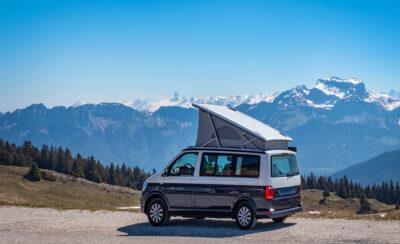
Campervans aren’t necessarily cheap. They’re certainly more expensive than cars, and they often come across as dearer than equivalent coachbuilt motorhomes. But they serve a different purpose – often doubling as a daily driver as well as a leisure vehicle. And the holiday and touring memories they’ll give you are absolutely priceless.
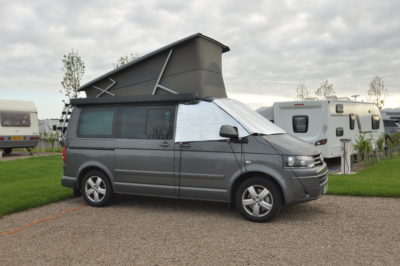
So, it’s an investment. One that will also hold its price particularly well. Especially if you buy the right vehicle in the first place.
What is a campervan?
You might be surprised to hear there is no legal definition of a campervan. Rather, UK body the DVLA prefers the catch-all term “motor caravan” to define any kind of motorhome, stating: “Motor caravan means a special purpose M category (i.e. passenger-carrying) vehicle constructed to include living accommodation which contains at least the following internal equipment: seats and a table; sleeping accommodation which may be converted from the seats; cooking facilities; storage facilities. This equipment must be rigidly fixed to the living compartment; however, the table may be designed to be easily removable.”
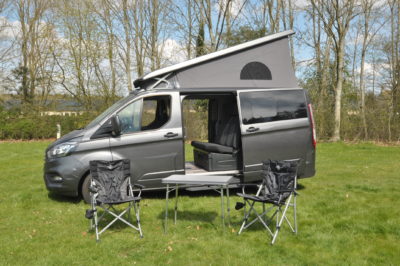
For our own purposes, here at Caravan Guard our definition of campervan includes van conversions of any size, i.e. anything that retains the metal body of the original vehicle (usually including at least one sliding side door) and includes a conversion inside that provides beds, kitchen, storage and sometimes even all the way up to a full-sized washroom.
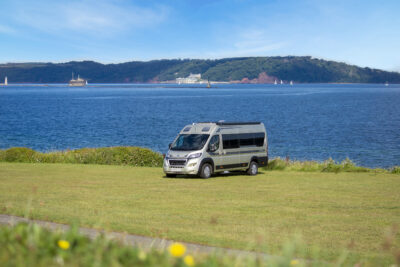
Caravan Guard provides specialist campervan insurance for all types of campervans up to 25 years old, as long as they have been professionally converted.
10 top tips for buying a new campervan
-
Do your research
Do you really want a campervan? What are you going to use it for? How long are you looking to own it? Where will you keep it? Are you aiming to drive it on a daily basis? How many people are you expecting to accommodate – for safe travel with seatbelts as well as sleeping berths?
All good questions to ask, especially if you’re considering making that significant first step into campervan ownership.
It does all start with some good old homework, starting with the questions above, not forgetting critical factors such as your budget and what other hobbies and pastimes you want to use your campervan for.
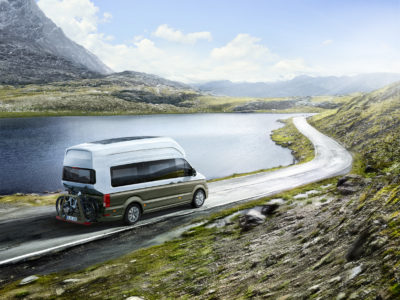
So, exactly what type of campervan you want is a good starting point. Classic campervan conversions, typically using Volkswagen’s Transporter as their base, have elevating roofs and a floorplan that provides kitchen, wardrobe and other storage along one side, plus a rear bench seat that converts into a double bed; other layouts are available.
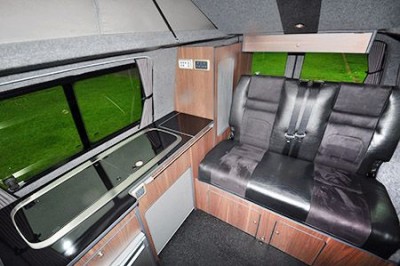
Moving up in size to a van conversion based on the likes of Fiat’s Ducato, Peugeot’s Boxer, Mercedes’ Sprinter, or others, means greater flexibility in terms of floorplans, and nearly always this allows for the inclusion of a washroom with shower and plumbed-in toilet facilities.
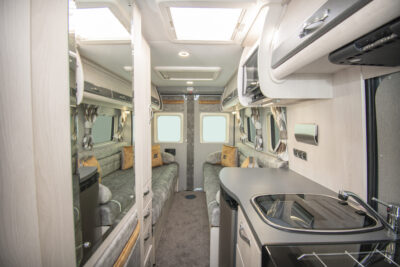
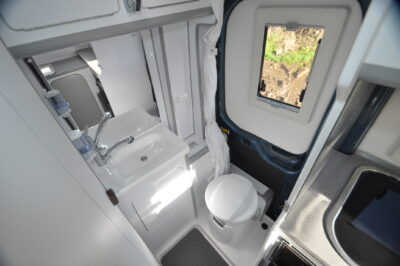
See also… our article on choosing the right campervan layout: Also, if you think a pre-owned campervan is a better way to start off (and generally it is), see our article on buying a second hand motorhome (the main points apply to campervans)
-
Elevating roof or high-top?
An early decision to make is whether you want a campervan with a permanent high roof, or one with an elevating roof. There are key pros and cons for each. A high-top (permanent high roof) model provides standing room at all times, also with the opportunity for better high-level storage and bedding; the downsides are car park height barriers become a challenge and fuel consumption suffers.
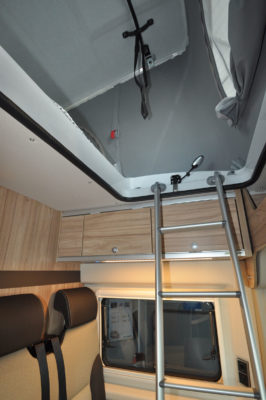
With an elevating roof (sometimes called a rising roof or a pop-top), you simply push it open whenever you need it. The canvas sides will also provide better ventilation because there will be large opening panels.
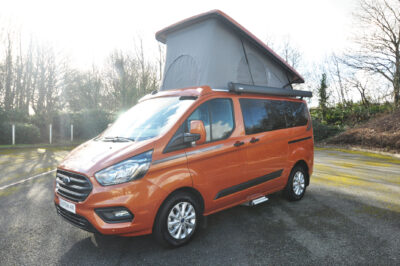
Disadvantages are storage – you might not even be able to stow your bedding up here and the hassle of raising and lowering the roof section every time you want to use it.
More recently, mainstream manufacturers have started offering high-top models that also have elevating roofs, seemingly offering the best of both worlds…. Although that’s a decision you’ll have to take for yourselves.
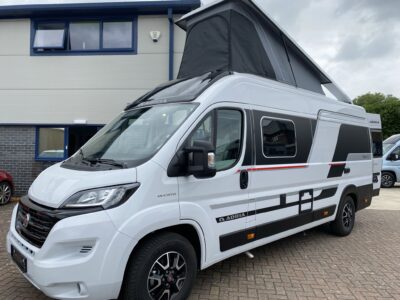
-
Gen up on the jargon
Especially if you’re fairly new to campervans, there’s a fair amount of industry jargon to take on board when buying a new campervan. Base vehicle, conversion, rising roof, rock-and-roll bed, berths… there’s plenty more to get to grips with.
See also… our Motorhome Glossary – it’s a great introduction to some of the industry words
-
Book some viewings
Although going online will allow you to see so much, there’s no substitute for getting out there and viewing campervans for yourselves. You can view at specialist retailers or at shows (indoors or outdoors) dedicated to campervans and motorhomes.

Go somewhere where you can view a variety of campervans. That’s the best way of comparing and contrasting different designs, asking about various manufacturing processes and more.
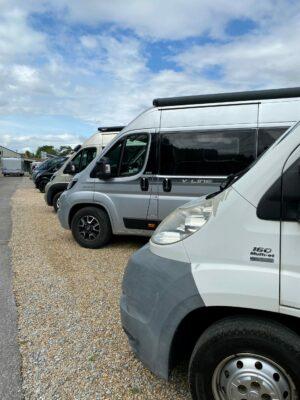
When you do view, make a note of any particular vehicles you like – that should include the manufacturer’s and retailer’s name, and the base vehicle.
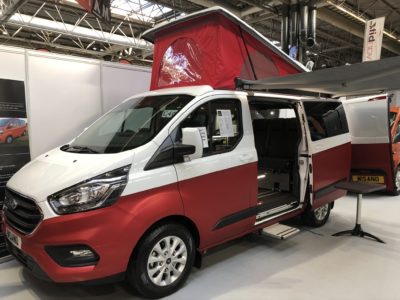
Do call ahead to a dealership or retailer to make sure any particular campervans you want to view are in stock. It’s also worth stressing to any salesperson what point you’re at on your buying journey – that can be anything from “just browsing” to “ready for buying a new campervan”.
Don’t get too carried away by any initial attractions of fancy paintwork and alloy wheels, or indeed bright interior colours. It’s the underlying quality you want to be happy with.
You’ll also glean a lot of knowledge from speaking to owners of campervans.
See also… the UK has two main exhibitions at the Birmingham NEC for those interested in buying a new campervan (see www.thencc.org.uk).
Look out for regional events near you, too.
-
Which campervan retailer?
There are lots of motorhome dealers out there – nearly all of them happy to help ease you into campervan ownership. And they’re a perfect place to start your search.
In the campervan sector, though, there are alternatives. Like smaller manufacturers who prefer to sell their vehicles direct (usually from their manufacturing base). The best of these produce to particularly high standards.
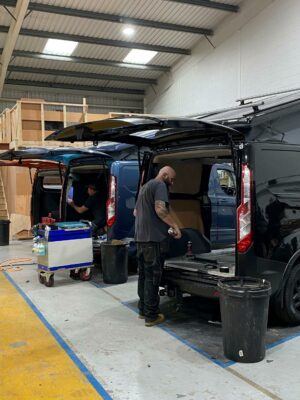
Wellhouse Leisure
There are also lots of converters who produce on a smaller scale, often offering a more bespoke service in terms of whether and where you want certain fittings.
In addition, some of these smaller manufacturers are happy to fit out an already-registered van – which could be supplied by you or them – with a brand-new campervan conversion. This will involve changing the vehicle’s status from van to motor caravan with the DVLA.
See also… Key manufacturers and dealers are usually members of the UK trade body, the NCC (National Caravan Council). Other accreditations to look out for include Volkswagen’s Motorhome Qualified and Ford’s Pro Convertor schemes, both of which expect conversions as well as the companies behind them to meet certain standards. Ideally, manufacturers/convertors should have British Standards ISO 9001 certification.
-
Campervan service points
Aftersales service is another critical factor when buying a new campervan. It’s what a retailer can offer beyond just selling you a vehicle – that means things like servicing (of the conversion as well as the base vehicle), repair work, accessories fitting and more. Reputations count for a lot here, too.
Look for any customer satisfaction awards from the likes of Practical Motorhome magazine. Online reviews are also good indicators – but sometimes you need to read between the lines.
-
Get down to the nitty-gritty
All motorhomes are compromises, arguably more so when it comes to campervans. You want the structural integrity of a van, the driveability of a big car, yet you will want all manner of living facilities on-board too. And that includes storage. Here, the smaller the vehicle, the more critical the storage factor becomes.
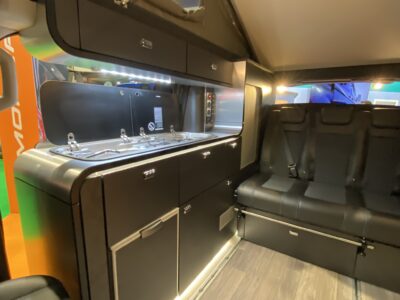
Look for fitting that will optimise storage, such as underfloor gas tanks (which do away with the need for a locker for gas cylinder), or even heating and hot water appliances that are fitted outboard.
A variety of lockers – from large to tiny – will always come in handy. Make sure larger storage areas are suitable shelved and/or have lashing points to keep loads secure in transit.
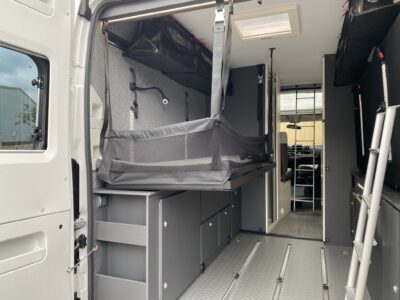
If you want more, do consider using the addition of items like bike racks as part of your negotiations. At this stage you might also be considering whether a campervan awning could be a useful accessory. They can certainly add some much needed living space for longer trips away.
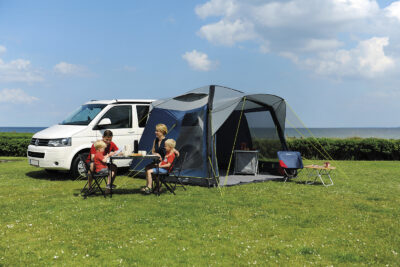
Overall style – exterior and interior – is always going to be down to individual preferences. However, do try and look beyond the glitz and do your own quality assessments.
See also… much of the advice in our guide to buying a new coachbuilt motorhome is pertinent to campervans. Also this article on extra storage for motorhomes has many tips that you could apply to campervans.
-
All about the base
Base vehicle – in recent decades, diesel has been the preferred power source for campervan engines. You can pick up petrol campervans, but they’re few and far between, especially when it comes to new models.
As for electric, it’s still very early days. Range is the main issue here, along with the fact that electric-powered versions of all base vehicles are considerably more expensive than their current diesel equivalents.
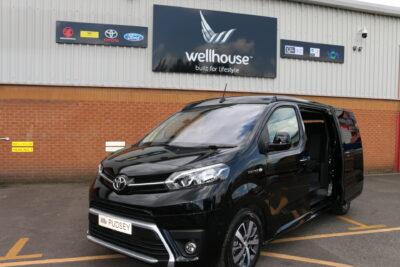
Base vehicles also vary widely in terms of their overall specifications. If the likes of cab air conditioning, stereo systems, Bluetooth connectivity, safety fittings, security features and more are on your priorities list do make sure your campervan comes with them – either as standard or optional extras that you might need to budget for.
When insuring your campervan, you’ll most likely need a Thatcham category 1 approved alarm and for some more expensive models, an approved tracking device. Check with your specialist campervan insurance provider if they have any security requirements but remember extra safety and security features often attract an insurance discount.
Do be aware that all campervan base vehicles come with a variety of different power and torque ratings for what initially looks like the same engine so be careful in your choice. You may prefer to pay a bit more to get an engine with a bit more oomph. There’s also a good choice these days of manual or automatic transmissions.
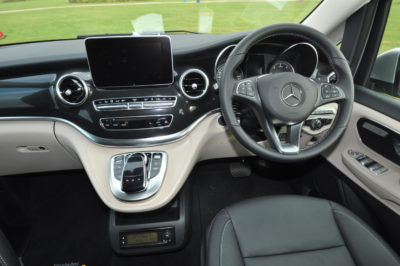
Other factors to consider are where you’re going to store your campervan and where you want to park it on your various travels, especially when it comes to trips other than camping, e.g. to the shops. For ease of everyday use, keeping to compact models may be your best option.
You’ll also want to be aware of the ever-increasing numbers of emissions or Clean Air zones in towns across the UK, and beyond.
See also… Check what motorhome you are eligible to drive here https://www.caravanguard.co.uk/news/what-motorhome-can-i-drive-28628/.
-
Go with your gut instincts when buying a new campervan
Trust yourself. You’ve done your research, you’ve viewed lots of vehicles and you’ve got the background on the manufacturer/retailer you want to deal with.
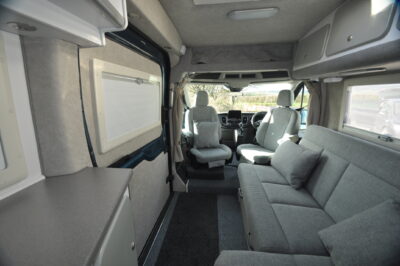
If the campervan you want to buy looks right and feels right – and the same goes for the people you’re dealing with – there’s every chance it is right.
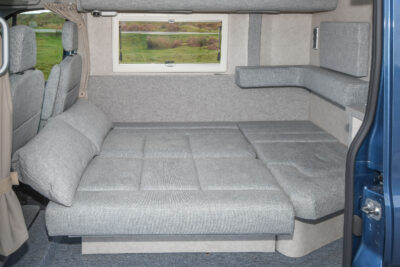
When it comes to the actual buying process, you’ll get a much better deal if you’re prepared to negotiate over any desirable accessories rather than just price. If you’re totally new to campervanning, do ask about starter packs as well as gas cylinders, toilet chemicals, levelling ramps etc.
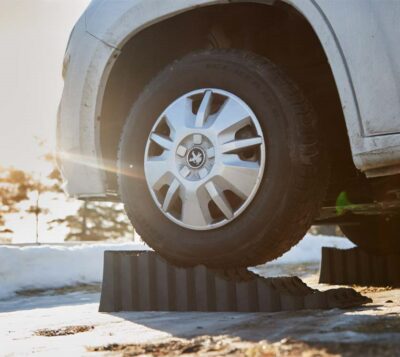
See also… look out for our regular gear guides (and giveaway competitions!) as well as general articles on accessories, starting here.
-
Enjoy!
Choosing and, ultimately, buying the right campervan for you should be an enjoyable process. But even more enrichment will come from getting out there and using it. Be prepared for things not always being perfect… it’s how you cope that matters.

It’s a good idea, when it comes to collecting your new campervan, to book into a local campsite, where you can run it through its paces, get to know it, and check for any potential glitches that might need referring back to your supplying retailer. But, not before you’ve sorted your campervan insurance, of course!
See also… our article on using a motorhome for the first time here. We regularly review new campervans too – check out our latest ones here: www.caravanguard.co.uk/news/category/campervan-reviews
Over to you…
Got any advice to pass on to newcomers especially when it comes to buying a new campervan? Please feel free to add a comment below.


How would you rate this article?
Comments